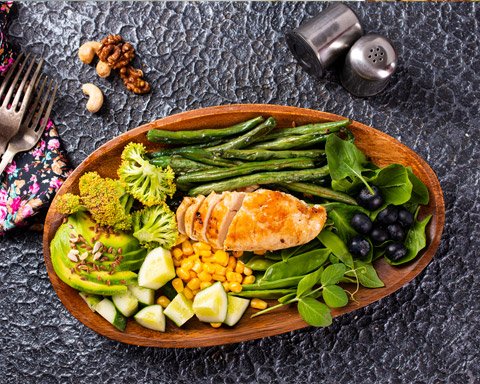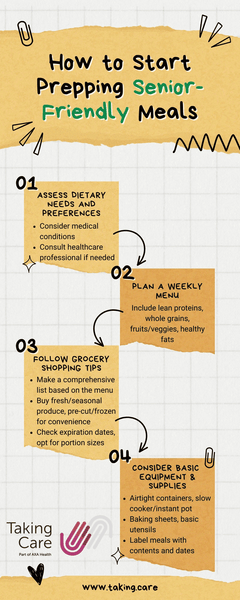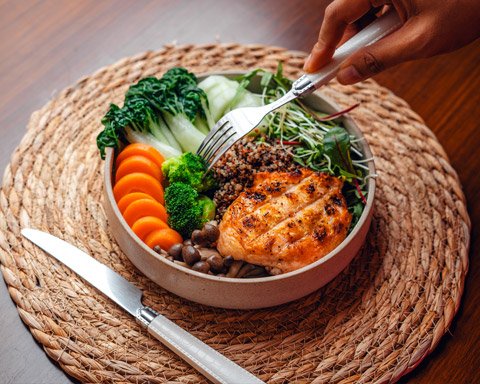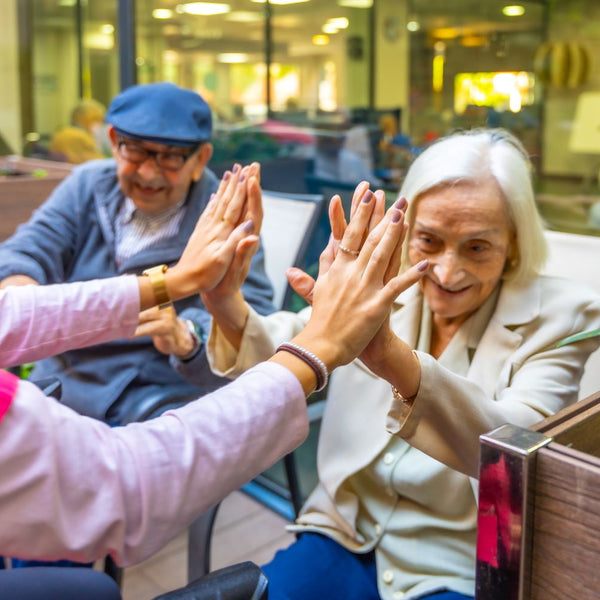As we age, our dietary needs and preferences change, and this should be reflected in a balanced and nutritious diet. However, older adults may face challenges in meal preparation due to decreased mobility, cognitive impairment or lack of motivation to cook for one.
Prepping meals in advance can overcome these barriers and ensure that the elderly consume a well-balanced, nutrient-dense diet.
In this article, we look at how to create a meal plan that is simple, nutritious and delicious for older adults, as well other family members.
Jump to:
- What are the benefits of meal prepping for seniors?
- How to start prepping senior-friendly meals
- Simple and nutritious meal prep ideas for elderly people
- Tips for food safety and storage
- Adapting meal preparation for special diets
What are the benefits of meal prepping for seniors?
Time and energy savings
Meal prepping involves preparing multiple portions of meals and snacks for seniors in advance. This trick reduces the time and effort required for daily cooking. It can be particularly beneficial for elderly people who may experience fatigue or have limited energy reserves.
Portion control and reduced food waste
By planning and portioning meals in advance, seniors can better control their portion sizes. Meal planning also reduces the risk of overeating or undereating. This method helps to minimise food waste, as ingredients are used more efficiently, and leftovers can be stored for later consumption.
Variety and balanced nutrition
Older adults can incorporate a diverse range of nutrient-rich foods into their diet. Meal preparation ensures they get adequate amounts of essential vitamins, minerals, and other beneficial compounds needed at their age. Well-planned meal prep can help seniors meet their daily nutritional requirements and maintain their overall health.
Convenience and independence
Pre-prepared meals and snacks provide seniors with easy access to various healthy food options, even when cooking from scratch may be challenging. Meal prepping promotes independence by enabling the elderly to maintain control over their dietary choices. This way, seniors may not need a helping hand with meal preparation.

How to start prepping senior-friendly meals
1. Assess dietary needs and preferences
Before starting a meal prep routine, consider the elderly’s specific dietary requirements and preferences. Take into account any medical conditions that may influence seniors' nutritional needs. Consult with a reliable healthcare professional or a registered dietitian to get professional help in developing an appropriate meal plan.
2. Plan a weekly menu
To efficiently organise a senior-friendly meal prep, make up a weekly menu that incorporates a variety of nutrient-dense foods. Consider including lean proteins, whole grains, a variety of fruits and veggies, and healthy fats in the menu planning process.
3. Follow grocery shopping tips
Make an extensive grocery list based on the weekly menu to ensure all necessary ingredients are available. Choose fresh, seasonal produce and consider purchasing pre-cut or frozen vegetables and fruits to simplify meal prep. Always check expiration dates. Opt for portion-sized packages when possible to reduce waste.
4. Consider basic meal prep equipment and supplies
Having the right tools at hand can make prepping meals for seniors more efficient and enjoyable. Essential equipment may include airtight storage containers, a slow cooker, baking sheets, and basic cooking utensils. Labeling pre-prepared meals with the contents and putting dates can also be extremely helpful for the organisation.
Simple and nutritious meal prep ideas for elderly people
Batch cooking and freezing main dishes
Prepare larger quantities of hearty stews, casseroles, or broth and portion them into individual servings that can be frozen for later use. This provides seniors with a variety of ready-to-heat meals that can be easily accessed.
Prepping ingredients for easy assembly
Cut and wash vegetables, cook grains in bulk, and prepare proteins like grilled chicken or baked fish in advance. This way, older people can quickly assemble meals by combining pre-prepped ingredients, which reduces the time and effort required for daily meal preparation.
Pre-prepared breakfasts
Prepare nutrient-dense breakfast options like overnight oats, egg bites, or breakfast burritos. Such options can be easily reheated or grabbed on the go. This ensures seniors start their day with a balanced meal that promotes sustained energy throughout the day.
Healthy snacks and mini-meals
In addition to main meals, prepare portion-controlled snacks like hummus with vegetable sticks, yogurt deserts, or whole-grain crackers with cheese. These options can help elderly people meet their nutritional needs. Mini snacks between main meals avoid long periods without eating, which can be detrimental to overall senior health.

Tips for food safety and storage
- Handwashing is the first line of defense against foodborne illnesses. Seniors should make a habit of washing their hands thoroughly with soap and warm water before, during, and after handling food. This simple practice helps to eliminate bacteria and cross-contamination.
- A clean and sanitised work environment is a must. Surfaces, utensils, and equipment must be cleaned and sanitised before and after meal preparation. Prepare separate cutting boards for raw meats, poultry, seafood, and fresh produce. This will prevent cross-contamination.
- Proper cooking temperatures are essential for killing harmful bacteria. Use a food thermometer to ensure that all goods are cooked to the recommended internal temperatures. Cooked foods should be cooled quickly to prevent the growth of bacteria.
- Use airtight, food-safe containers to prevent moisture loss, cross-contamination, and odor absorption. Label food containers with the contents and preparation date. Seniors should be mindful of expiration dates and consume prepped meals within the recommended timeframes. Any food that exhibits signs of spoilage, such as an off-odor, discoloration, or mold growth, should be tossed without hesitation.
Adapting meal preparation for special diets
For seniors with specific dietary restrictions or food allergies, meal prepping can be tailored to meet their unique needs. Clearly label all prepped meals and snacks with ingredients. Make separate batches of dishes to avoid potential cross-contamination.
The elderly with diabetes or cardiovascular conditions may require special attention to meal planning. Focus on incorporating whole, unprocessed foods. Consider nutrient-dense options like lean proteins, high-fiber carbohydrates, and healthy fats. These food options support better blood sugar control and heart health.
Some older adults may experience difficulty chewing or swallowing certain textures. Modify recipes by pureeing or mashing ingredients. Add extra liquid to soups or stews if needed. Incorporate soft, easy-to-eat foods like cooked vegetables, scrambled eggs, and yogurt.
Summary
Meal prepping is an invaluable tool for older adults to maintain a healthy, balanced diet while overcoming challenges associated with meal preparation. By planning meals in advance, elderly people can enjoy a variety of nutrient-rich foods, control portion sizes, and reduce food waste. Start small, gradually incorporate meal prepping into your routine, and seek guidance from healthcare professionals if needed. These tips will help you develop a senior-friendly plan that meets their specific dietary needs.
Smart home monitoring systems for the elderly can help you manage their health and wellbeing too.
Find out more
Smart home monitoring systems are usually a small, discreet proactive home monitoring sensor that alerts us if there’s a change in daily living activities that could indicate a problem. They can be used alongside a personal alarm or elderly falls alarm



